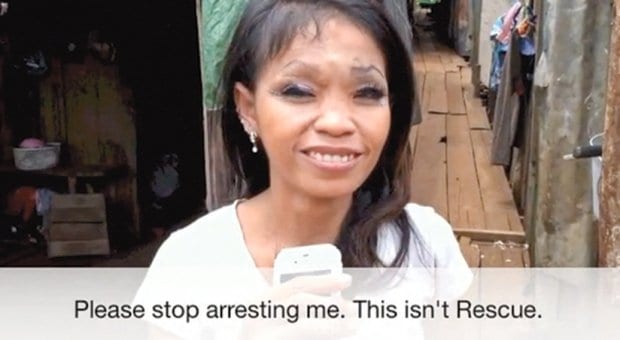It’s time to distinguish between sex workers and trafficked people, Cambodian sex workers say in a new film made in conjunction with a Canadian journalist.
“We are adult women, men and transgender. We work in karaoke bars, massage parlours and the streets. We choose to work. We are not victims. We are not trafficked. No one owns us. We do not have pimps; no brothel owners enslave us,” Keo Tha says in Sex Workers Hurt by Rescue in Cambodia. “We don’t want to be rescued.”
Tha is the coordinator of Women’s Network for Unity (WNU), a 6,400-member sex workers’ union. Canadian journalist Paula Stromberg worked with WNU during her month-long stay in Cambodia to film, interview and edit footage with staff. One of Stromberg’s most dependable guides and closest acquaintances was Pisey Ly, a lawyer and WNU assistant.
“It was a great opportunity to collaborate with Paula on these mini-films,” Ly says via email from Phnom Penh. While some members of WNU have basic training in photography, audio and video production, Ly says the lack of equipment remains a barrier to making their own film.
This is not the first time WNU has participated in documentaries to highlight the human rights situation for Cambodian sex workers. The union produced the short film Caught Between the Tiger and the Crocodile in 2008, and contributed to MTV No Exit, a campaign by sex and garment workers in Cambodia and around Asia against the MTV Exit anti-trafficking campaign, which Ly says addressed only the issue of sex slavery, not the bigger picture of voluntary sex workers who have no other economic prospects.
“The best way to stop sex trafficking is to decriminalize sex work and give sex workers full human and labour rights,” Ly says.
“In Cambodian society, it is a girl’s duty to support her parents and brothers as well as her own children. But without education, girls face a life with very few choices,” Tha says in the film.
Stromberg created two versions of her documentary, one in English and the other in Khmer. A WNU delegation recently presented the Khmer version at the Sex Worker Freedom Festival in Calcutta, India.
Despite growing awareness of the complexity of the situation for Cambodian sex workers, Ly says the situation hasn’t improved. “Freelance sex workers and those who work in the massage parlours continue to be arrested. However, they are not physically beaten or raped as it was happened in 2008 to 2010.”
It’s a slight improvement, which Ly attributes to groups like WNU challenging the laws.
“In the end, the discrimination and violence — which involve the laws, policies, programs and morality — are the challenges,” she says.

 Why you can trust Xtra
Why you can trust Xtra


